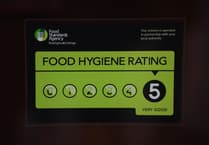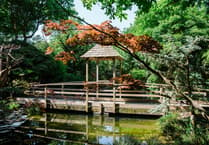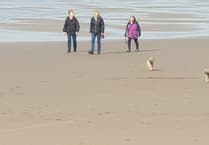Portwrinkle was once regarded by the people of Millbrook and Cawsand as a holiday resort – families would hire a donkey and cart to make day trips to the tranquil port with its beaches.
The trend seemed set to continue; the arrival of a golf club and a grand hotel brought a succession of well to do visitors to Portwrinkle, and in the sixties an austrian style chalet was built by the residents of Dartington Hall as a holiday home and retreat for recuperating friends and family members.
Today the village has a curious character - still a holiday town and favoured by beach-going local families, many one-time visitors who settled in the 60s and 70s, greatly expanding the community.
Still without a church, public house or shop, Portwrinklers have traditionally looked to Crafthole, their sister village in the parish, for social opportunities.
In 1605, Richard Carew of Antony House granted a building lease to Oliver Walleys of Sheviock for a 'cellar and palaice of Port Wrickell', and so it was that a small yet prosperous village was founded on the pilchard industry.
Remains of the early 17th century pilchard cellars are still evident today, adjoined by Portwrinkle's clutch of original houses. The harbour with its narrow entrance was shored up with concrete in recent years, but otherwise has remained unchanged .
According to historian Tony Carne, the village's name comes from the cornish 'porth' meaning landing place and 'gwigell' for 'little cove.'
Three families first settled to make their living in Portwrinkle; the Andrews, the Dawes and the Pengellys. We met one member of the latter family, Margaret Bartlett, and her husband William, at their home, Smuggler's Cottage - the first to be built in the village.
Smuggling
Above the doorway of the cottage is marked 'TH 1795' and there are a couple of ideas as to what this means; most probably it refers to one Thomas Hellman, whose name was on the original deeds, and who ran the flourishing free trade of the time - smuggling continued until well into the 19th century, despite the efforts of customs men stationed in the village.
Apparently there was a secret compartment under some flagstones in Smuggler's Cottage - just big enough to conceal a keg of brandy.....
Margaret remembered how when she was a girl, everyone in the village was involved in the same type of work, and almost all were related. Much of childhood was spent on the water, as she said; 'The first thing we had to learn was how to swim - and then how to row a boat.'
It may seem idyllic, but she explained that children were expected to help out with all aspects of work. 'We had to plant potatoes and pick laverweed to make laverbread,' said Margaret, 'you'd have to yank it up the cliff, and at the end of the season if we were lucky we'd get 10 shillings.'
There was enough work during the season to support itinerant workers and their families who lodged above the fish cellars, but local men would have to supplement their income through the winter by growing potatoes on the steep fields above the seafront. Margaret's father was also Portwrinkle's coastguard - the boathouse stood on the site of the present sewage pumping station.
Margaret and William also described how days would be spent waiting to go and catch a school of bass - Margaret's father was a 'Huer', someone who would follow the progress of a school and alert the fishermen when the fish were in a prime spot for catching, using branches to direct the boats.
Rich
If a school of bass came in people would take the day off work to take a share in the profitable catch - once a ton was landed at Portwrinkle and was sold door to door in Millbrook, but mostly bass was exported to France.
However, rich catches were becoming the exception - hard competition came from Looe and at the turn of the century the fishermen of Portwrinkle formed a cooperative, the 'Poor Man's Endeavour.' The men who worked hard together also drank hard together - Margaret's brother has some of the cooperative's accounts and according to William an 'incredible amount' went on revellry!
Between the wars seven boats worked out of Portwrinkle, and by the 60s its fishing industry was more or less over, but one full time and two part time fishermen continue today.
As with so many tiny villages, tourism in Portwrinkle became dominant as fishing went into decline, and the potato fields behind the original cottages were heavily developed around 30 years ago.
From John Cameron's house on Whitsand bay view you can see over the older cottages, and the pilchard cellar walls, out to the Bay from Rame Head to Looe Island.
John moved to portwrinkle in 1980 - an electrical engineer by profession, he semi-retired when he came to Cornwall, but has done several jobs including lecturing at the College of Further Education in Plymouth and working as presiding officer for Caradon District Council.
John's love for Cornwall began with a shark fishing trip to Looe when he was 18, after moving to Landrake in 1977, he and his wife had to wait for two years before a house went up for sale in Portwrinkle. He described how in the past 20 years the village has continued to expand; 'Before it was a more close-knit community, Christmas went on from December to March because everyone wanted to make sure they'd invited everyone else into their homes. It's not like that anymore because there are enough people here not to know everyone.'
Sadly John lost his beloved wife Dorothy to cancer in 1987. John is fairly involved in local and parish life - he's a member of the Torpoint-Benodet twinning association and has been a parish councillor for just over a year. 'I felt this corner of the parish needed a representative,' he said, 'I was asked to do it and I decided it was time to put something back into where I live.'
John also describes himself as a 'groupie' for the local Kessenyan singers, and although he doesn't sing himself, he is learning to play the violin. He explained that a baby piano in his living room 'belongs to a chap who has a holiday home here - when he goes back and forth to London, he parks the piano here.'
Hotel
Further up the hillside at the entrance to the village, the Whitsand Bay Hotel is a commanding and prominent feature set in Cornish limestone. It looks like it should have been there for all time but in fact the hotel was moved, stone by stone, in 1909, when the land it stood on at Thankes field in Torpoint was made a compulsory purchase of the admiralty. Then the home of the Graves family, it opened as the Whitsand bay Hotel in 1910 and was bought by the Earle family in 1962
Built in the tudor / gothic style with a medieval tower, the hotel gives the impression of rather haughty grandeur, but this is far from the case when it comes to the philosophy of the service - around 70% of guests are returnees who come back for the friendly atmosphere and service of a family-run hotel. A photo in the Eddystone lounge shows one family who between them have made 500 visits!
Celebrity
The hotel has had a good share of celebrity guests, who like Portwrinkle for its tranquillity and seclusion. Marie-Christine Earle told us about a couple of their famous guests; 'Rick Wakeman, the keyboard player with the group Yes came and stayed here with his children for three weeks. They arrived in a pink rolls royce - being carried on the back of a pick-up truck because they'd broken down!'
Boy band E17 were visitors during last year's Van Morrisson festival, and according to Marie Christine spent a lot of time at the bar - signing autographs for children.
Marie-Christine explained that she, her husband Jess and their family used to live at the hotel 'but we realized you can't always live above the shop.' Now the family live in Quethiock and take it in turns to run the hotel and look after home and family.
Some believe that the Whitsand Bay Hotel is visited by other-worldly guests; 'There is a sort of druid that lives in the village,' said Marie Christine, 'and he said that there are twins in Room 7.' And Jess added that when he was a child he saw a 'presence' in what used to be Room 44.
However housekeeper Sheila Hooper takes a more down to earth view of the comings and goings in the hotel's 40 or so rooms; she arrived 35 years ago to work as a nanny and is now in charge of around 14 chambermaids and men, keeping things in perfect running order. Sheila is one of the longest serving members of a staff of around 70 - unusually the head chef, Mark Farmer, has also been with the Whitsand Bay Hotel for 15 years, and head waiter, Terry Kitchen, for 25. 'The really key people have been here for a lot of years,' said Jess, 'and it shows in the atmosphere.'
Many guests come on golfing breaks - the hotel owns the course but the club is run separately - or to take advantage of the area's safe and sheltered coastline.
Dom Pengelly manages the shop at the Whitsand Bay golf club - and is 'partner in crime' with Stephen Poole, the golf pro who has been giving lessons in Portwrinkle since 1976.
Quiet
Dom explained that as he was growing up, many of the houses in the village were holiday homes; 'There were about 24 houses,' he said, 'but of those only 7 or 8 were lived in.'
'It was very quiet, that's the main difference. I'm not all that old, but even in my time no-one had a car - great if you missed the school bus!'
Nowadays almost all the houses are lived in all year round - but Dom highlighted the difficulty for young people in finding affordable housing in the area; 'out of all the people I went to school with, only three live in the parish. The saddest thing for me is that people that grow up here can't afford to live here,'he said.

.png?width=209&height=140&crop=209:145,smart&quality=75)

